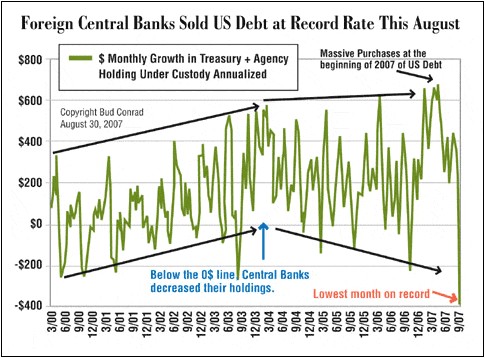Casey Files:
 The
Continuing Crisis The
Continuing Crisis
David Galland
Sep 11, 2007
David Galland is Managing Director
of Casey Research, LLC., publishers of Doug Casey's International
Speculator, a monthly newsletter focused on identifying high
quality natural resource stocks with the potential for a double
or better over the next 12 months. A 3-month
risk-free trial to the letter is available for interested
investors.
In all our publications, we
have recently taken a good, hard look at several facets of the
unfolding crisis.
Over the last week, the Casey
Research team has continued doing a forensic analysis of where
this all might lead, and especially how it will affect our collective
investments.
In a minute, I'll share a summary
of our current thinking, but first want to stress that, given
the scope and the complexity of the situation, divining the future
from this point on is no easy task.
Doug Casey has often said the
crisis could be deflationary or inflationary, he wasn't sure
which, but he was pretty sure about the crisis part. Now that
it is up close and personal, we are beginning to get a better
sense of the nature of the beast and can make strategic adjustments
to our outlook, and our portfolios.
After reviewing reams of data
and engaging in long and intense dialogue, here is the briefest
of summaries as to our current position.
1. Global
stock and bond markets are in for some very bad days. Unfortunately,
when it comes to a rush for liquidity, investors will sell anything
they can get a bid on. That means even the assets that shouldn't
be sold - precious metals and stocks, for instance.
The weakness in gold in recent weeks, modest by contrast to other
sectors, is not due to a sudden breakdown in its historic role
as a store of value in periods of crisis. Rather, it is because
of the fact that it can be liquidated quickly and easily.
2. The stocks
of the larger gold producers, which have already taken a hit
on deflationary fears, remain at near-term risk. If you own them,
you have two choices: hold through what's next, or take advantage
of their liquidity to step aside for a while. (More on that in
a minute).
3. We are
happy we recommended lightening up on the stocks of our greatly
appreciated junior base metals companies ahead of the recent
crisis. Now our attention turns to the junior precious metals
stocks. On that front, we are going to be increasingly focused
on those with the best management teams, cash in the bank and
which are clearly on to a significant deposit.
Which raises the question of
whether one should try to sell any junior gold share at
this point? Especially considering that many are already off
sharply, and volume for most stocks has largely dried up.
Answering requires stepping
back for a further look at the big picture.
 There
has been a lot of talk about the current credit crisis being
deflationary, and that will be bad for gold. We have looked hard
at this issue and come to a couple of conclusions. There
has been a lot of talk about the current credit crisis being
deflationary, and that will be bad for gold. We have looked hard
at this issue and come to a couple of conclusions.
- Up until this point, the Fed
has remained focused on fighting inflation. With the clear and
present danger of a deflation now sweeping the globe, the Fed
can, and soon will, shift its focus to heading off a recession
or worse. How might they do that? Ah, now we recall the words
of Fed Chairman Bernanke when he said that, should the occasion
warrant it, he would not hesitate to drop dollar bills from a
helicopter.
- When will the engines of those
helicopters fire up? The engines are warming up now. We say that
because nothing the Fed and other central banks have done to
date will have anything more than a transient effect on this
crisis. It is just a matter of days, and maybe even hours, before
the next delivery of bad news arrives: CODs and the stock markets
move again into crash mode. Only, next time, the fear that the
Fed will be ineffective will likely send the markets down harder
and faster than anything we've witnessed yet.
 And
once the dollars start flying, there'll be no stopping them. And
once the dollars start flying, there'll be no stopping them.
But what of the U.S. dollar?
After all, once the printing presses fire up to full speed, and
the Fed Funds rate begins to ratchet steadily downward, won't
the Chinese and other non-U.S. holders of our 6 trillion dollars
show their displeasure by ridding themselves of the things, driving
the dollar down even further? Surely that can't be allowed. Can
it?
In a call with long-time friend
Clyde Harrison, one of the most seasoned and sharpest players
on the commodities scene (he invented the Rogers International
Commodities Index Fund), he quipped to the effect of, "We're
in an election cycle and the foreign holders of U.S. dollars
don't vote. By contrast, the U.S. voting public is up to its
neck in debt. When push comes to shove, the dollar will be sacrificed."
We think he is right. And I
would add one more observation. The only shred of fabric remaining
somewhat intact in George Bush's tattered legacy is the relative
strength of the economy over his term. To now have the economy
go down in flames on his watch is unacceptable to him and, more
important, his political cronies. What moves are left to them
at this point other than ramping up the money engines? None at
all.
Oh, and choosing the path of
inflation offers one more tangible benefit. The effect of a massive
ramp-up in the supply of money, enough perhaps, to rescue the
hundreds of billions otherwise destined for money heaven, is
that the inevitable consequence -- higher prices -- won't be
fully felt until after the upcoming presidential elections. In
other words, it won't be crisis diverted, but rather crisis delayed.
There is a fly in the ointment,
however. This particular fly won't sit passively while its wealth
is destroyed. I refer, of course, to the aforementioned foreign
dollar holders. Looking under the hood as he is wont to do, our
chief economist Bud Conrad has already found signs that they
are starting to edge back from the weekly Treasury auction.

What this means to us is that
while there is a real risk that the shares of our favorite companies
- and possibly even gold itself -- will come under pressure with
a general stock market crash, we don't expect the pressure on
gold to last long not in the face of the tsunami of money that
is going to look for a new and safe home.
And central banks? Won't they
try to keep gold down on the farm? After all, if it starts to
take off, as we continue to feel is inevitable, won't that risk
expose the fact that the emperor's clothes are made of paper
that fall to pieces in the first moderately heavy rain?
Yes. And so we will expect
to see more announcements of central bank sales. But the impact
this trick has on the price of gold will be diluted with each
new announcement. In time, announcements of further sales will
be met with cries of legitimate outrage by citizens concerned
their central bankers are trading away their only tangible holdings.
The dollar is headed toward the sacrificial altar, with a knife
made of gold. Sooner or later, the central bankers will have
to throw in the towel and just let gold run.
These are not ordinary times
and the outcome likely won't be ordinary either. Good or bad.
Assuming that the best case takes care of itself, we will mostly
focus on the worst case.
[Editor's Note: The
September edition of the International
Speculator features an in-depth discussion on how to prepare
yourself for the unfolding crisis, takes a look under the hood
at risky money market funds and much, much more. If you are not
yet a subscriber, sign up today for a risk-free trial. Click
here for details.]
Sep 10, 2007
David Galland
Casey Archives
321gold Ltd

|